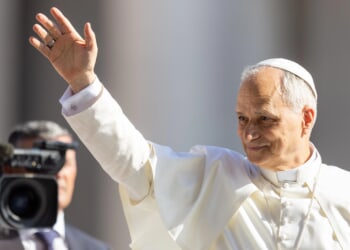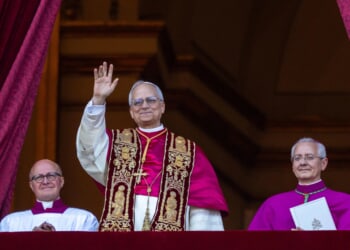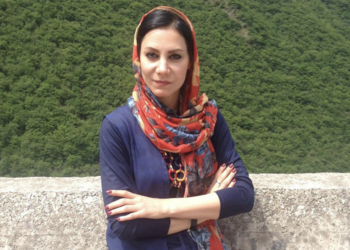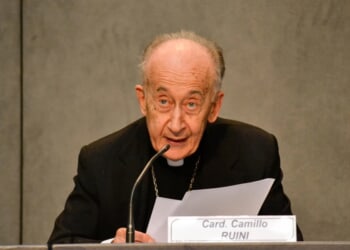Washington, D.C. Newsroom, Jun 26, 2025 /
18:02 pm
The United States Supreme Court on June 26, 2015, decided that every state is constitutionally required to perform and recognize same-sex civil marriages — a controversial ruling at the time that was followed by major shifts in cultural norms and public opinion.
When the justices handed down the Obergefell v. Hodges ruling in a 5-4 decision, only 16 states had already enacted laws legalizing same-sex civil marriage. The practice, however, had been ongoing in 21 additional states because lower courts had ruled against most state-level bans prior to the Supreme Court ruling.
In the aftermath of the ruling, some Christians have been sued for adhering to biblical teachings on marriage and human sexuality in relation to anti-discrimination laws. Broader movements to normalize both homosexuality and transgenderism have also led to legal battles over parental rights, women’s rights, and religious liberty.
A decade later, public support for same-sex marriage is higher than it was. Yet some polling has shown that the trend might be reversing, potentially due to the subsequent cultural battles that followed.
The United States post-Obergefell
Ever since the ruling, efforts to prevent discrimination have repeatedly been at odds with religious liberty and parental rights.
In Colorado, for example, a baker named Jack Phillips fought and won three multiyear lawsuits filed against him for refusing to bake cakes for same-sex civil weddings and gender transition celebrations. A Christian photographer in New York and a web designer in Colorado, along with others, also fought and won multiyear lawsuits based on their refusals to provide services for same-sex civil weddings.
Many legal battles on similar issues are still ongoing. Foster parents in Vermont and a mother looking to adopt in Oregon are suing their states over policies that require them to embrace gender ideology to participate in foster programs. Parents in California are suing the state over a law that prohibits teachers from informing parents about their children’s “sexual orientation” and “gender identity.”
The Supreme Court is considering a case in which a Maryland school board is refusing to let parents opt children out of course material that promotes homosexuality and transgenderism.
There are numerous political and legal battles nationwide over policies that allow biological males who self-identify as transgender women to access women’s locker rooms and other private spaces and allow them to participate in female sporting events.
“Obergefell gave license to the unraveling of social norms and understanding around sexual morality, family structure, and even personal identity,” Mary Rice Hasson, director of the Person and Identity Project at the Ethics and Public Policy Center, told CNA.
In Hasson’s view, the Supreme Court, equating a same-sex partnership with a marriage, “emboldened activists promoting the transgender agenda, which claims a ‘trans woman’ is just the same as a woman.”
“The same personal autonomy claims that license same-sex sexual relationships are used to license self-defined identity claims,” she said.
When the decision was laid down in 2015, about 60% of the public supported legal recognition of same-sex marriages, according to a Gallup poll at the time. This was a major shift over the previous two decades, as support was only around 37% in 2005 and as low as 27% in 1996.
A May 2025 Gallup poll shows that support increased to about 68% a decade later. Even though that’s an eight-point increase over the decade, the pollsters found that support has gone down for two years straight after hitting a peak of 71% support in 2022 and 2023, with the bulk of the decrease coming from Republican voters and young people.
When commenting on the decline in support over the past two years, Hasson said that “perhaps the excesses of sexual libertinism, championed by the rainbow groups and on display in pride parades, demonstrate that same-sex sexual relationships are not the same as marriage.”
(Story continues below)
Subscribe to our daily newsletter
Arthur Schaper, the field director for the pro-family group MassResistance, told CNA he sees “a growing movement against this,” mostly because “people are starting to see the consequences of it.”
“This kind of stuff is happening all over,” he said, referring to the imposition of gender ideology and homosexuality in public life. “This is just egregious.”
“Everything that we warned everybody about — what would happen if you redefined a fundamental institution and corrupted it — it has come to pass,” Schaper added.
Efforts to overturn Obergefell
The Supreme Court has not revisited Obergefell since the initial ruling, and Hasson expressed some pessimism about the current makeup of the court, saying it’s “unlikely to muster a majority to overturn” the decision.
Yet some groups, including MassResistance, have been encouraging state lawmakers to adopt resolutions urging the Supreme Court to reevaluate the ruling. Lawmakers in at least nine states have introduced such resolutions. The Idaho House and the North Dakota House passed their resolutions, but most efforts have failed to gain steam.
“We see this as a first step and we’re doubling down on our efforts,” Schaper said. “And we’re going to continue fighting this.”
Schaper said some of the arguments against the decision focus on 10th Amendment claims that the regulation of marriage is a state issue and not a federal one. He also referenced some of the dissenting opinions from the court that suggested the ruling “alters the relationship of citizen to government” by asserting “the government [rather than God] gives freedom, the government gives dignity.”
He said Obergefell is also “based on this fraud that people are genetically homosexual” and treats sexuality as though it is an immutable characteristic like race. He criticized Justices Ruth Bader Ginsburg and Elena Kagan for not recusing themselves from the case despite officiating same-sex civil weddings and reiterated the point that “redefining marriage has led to an imposition of values.”
Jennifer Morse, the president of the Ruth Institute, told CNA she believes “removing the gender requirement from marriage was bad public policy” and said Obergefell should be overturned.
In Morse’s view, a legal recognition of same-sex marriage “promotes the idea that the sex of the body is not significant, even for the most gendered thing we do, namely bearing and begetting children and assigning legal parental rights.”
“If the sex of the body doesn’t matter for marriage, it doesn’t matter on the sporting field, or in the locker room or in the prisons,” Morse said. “In this way, Obergefell paved the way for the excesses of the [transgender] movement.”
Morse also expressed concerns about the effect on children, saying that same-sex marriage distorts “how we see fertility, parenthood, and children” and “it tacitly assumes that biological connections between parents and children are unimportant and in fact negotiable.”
“Rather than seeing each and every child being a gift from God, children are increasingly seen as a lifestyle option for adults, who can acquire children pretty much however they like,” she added, referencing adoption by same-sex couples.
“Redefining marriage redefines parenthood,” Morse said. “Contracts among groups of adults, rather than an act of love between parents, form the basis of parenthood.”
Schaper argued that in the early 2000s, conservative arguments for traditional marriage were mostly weak and simply focused on “tradition or preference or religion.” In reality, he said the support for same-sex marriage is “putting your selfish desires ahead of the needs of children, of public health, and public order.”
“If people just stand their ground and stand for truth, we can win,” he added.
Catholic Church teaching
In spite of consistent Church teaching, American Catholics support the legalization of same-sex civil marriages at about the same rate as the broader population. According to a 2024 Pew poll, about 70% of self-identified Catholics said they support same-sex marriage, which was slightly higher than the population as a whole.
Julia Dezelski, the associate director of the United States Conference of Catholic Bishops’ Committee on Laity, Marriage, Family Life, and Youth, told CNA these trends are a “downstream effect of cultural distortions of love for Catholics and non-Catholics alike.”
“The Church can address this issue by demonstrating that love for people who experience same-sex attraction is precisely what motivates us to oppose same-sex sexual activity,” she said. “The Church teaches the truth and beauty of human sexuality because it is true and beautiful, and therefore good for every man and woman.”
“Man and woman are created for communion,” Dezelski added. “The natural law inscribes this reality and desire in our very flesh. It finds its fulfillment in the one-flesh union of man and woman in marriage. Only two people of the opposite sex can experience this one-flesh union, from which the miracle of life is born.”


















